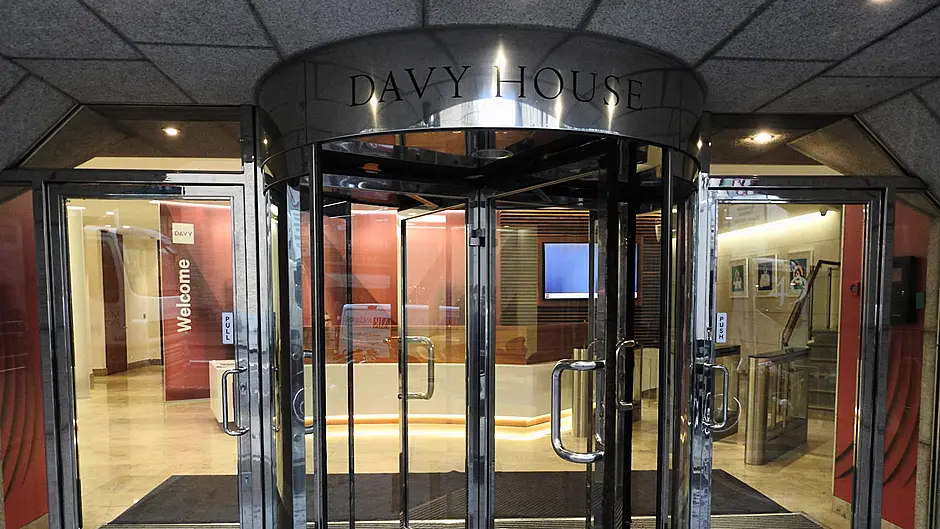What happened at Ireland’s largest stockbroker harks back to the worst excesses that came before the crash. And it was in 2014, just four or five years after the financial crisis, writes Harry McGee
I LOVE the slogan for Davy Stockbrokers which we hear on radio all the time. ‘It’s not just business. It’s personal.’
As the events of the past week have shown, it’s not an empty slogan. Not as far as 16 of its own executives were concerned, in any instance!
I’m not sure what has been worse. The revelation that Davy was fined over €4.13m by the Central Bank for not telling a client it was essentially both the broker and the buyer for a deal.
Or the fact that when the Central Bank findings were announced, the firm arrogantly declined to comment publicly on the matter, setting itself up as beyond scrutiny.
It took two days for it to comment publicly and only then in the most general way, with platitudes, stating it was satisfied that the issues of seven years ago would not be repeated.
It does bear repeating what happened. It harks back to the worst excesses that came before the crash. While the events relate to seven years ago (that’s how long the Central Bank regulator’s investigation took!) it must be borne in mind that it all happened in 2014, four or five years after the crash.
The background was that a Northern property developer named Patrick Kearney held bonds in the failed Anglo Irish Banks which he wanted to sell.
Davy handled the sale but they did not inform him that the consortium which acquired the bonds, O’Connell Partners, consisted of 16 Davy executives.
The deal was done without telling the compliance section of Davy itself of the potential conflict of interest, a clear breach of rules.
Tánaiste Leo Varadkar put it very well when he explained it last week: ‘It’s as though you were selling your house, the auctioneer pretended to be trying to get the best price for you, but was actually the buyer himself.’
Kearney himself expressed some doubt about the sale which netted €5.58m. He was told by another broker that he could get 60% more for the shares than was being offered (at 32c per share as opposed to 20c) but Davy told him that he could not go back on the deal that had been made.
He subsequently sued Davy and was awarded between €2m-€3m in a High Court settlement.
By this stage the regulator at the Central Bank had started its own investigation. Davy was less than forthcoming. The Central Bank said that in the initial stages Davy provided ‘vague and misleading details and wilfully withheld information that would have disclosed the full extent of the wrongdoing’.
It also found that it did not consider the obvious conflict of interest and did not inform the firm’s own compliance officers, whose job it was to make sure there was no conflict of interest and it was abiding by all the rules.
When the firm belatedly issued its press release, chief executive Brian McKiernan said that, in the deal, the company had departed from the standards it had set for itself and that processes had been put in place to ensure it would not happen again.
But then it emerged that McKiernan himself was one of the 16, so therefore he himself had departed from the standards that would be expected. The crisis took on an inevitable pattern. McKiernan resigned at the weekend, along with deputy chairman Kyran McLoughlin, and head of bonds Barry Nangle. Two others in the consortium were named – former ceo Tony Garry and former Davy head of institutional equities David Smith.
It wasn’t as if this was a first. Back in 1993, the company was fined for allowing companies owned by Davy executives to buy shares in the newly privatised Greencore, at a time when Davy was a broker for selling those shares. At least two of the 16 held senior positions with Davy at the time.
So what happens now? It appears that this is not the end of the story with more pressure being applied on the stockbroking firm, which is Ireland’s biggest, with 800 employees and with assets of €14bn under its control.
Senior politicians, on the government and opposition sides, have been exerting pressure for more to be done. The focus has now shifted from the company to the individuals.
Minister for Finance Paschal Donohoe and Minister for Public Expenditure Michael McGrath have demanded more individual accountability.
Sinn Féin’s Pearse Doherty, John McGuinness of Fianna Fáíl have demanded to know how much profit the individuals made, and if they will be fined, or asked to return the money?
It’s complicated by the fact that many of the company’s shares are owned by its senior executives – Brian McKiernan, for example, is said to own 13% of its shares, and Kryan McLoughlin also has a major shareholding.
This might prove to be a headache politically. Minister of State at the Department of Finance Seán Fleming said on Sunday it needed to be dealt with as those who have resigned could still have a major bearing on company policy and direction.
‘The issue of people who have major shareholdings in that company continuing to have a major influence on the operations, even though they may have resigned from their executive roles, is a matter that needs to be dealt with very promptly,’ he told RTÉ.
The National Treasury Management Agency (which controls the State’s own debts, bonds and shares) is a client of Davy but this week it The National Treasury Management Agency has withdrawn stockbroker Davy’s authority to act as a primary dealer for Irish Government debt.
This was after Sinn Féin’s Doherty called on it to sever its links with the broker. ‘I think we’re left in a situation where the State can’t continue to provide reputational cover to an organisation which basically tried to ride this out. It issued a number of internal memos to its staff without acknowledging what had happened, and which only saw resignations of three individuals after public pressure.Davy has been caught out red-handed, not only that, but as an entity (it) has decided not to deal with this. That is unacceptable,’ Doherty had said.
An example of the small world of financial services in Ireland is the fact that the last head of the NTMA, John Corrigan, is now chairman of Davy.
Politically, politicians on all sides are hoping the Central Bank can now focus on the responsibilities and obligations of the 16 executives involved.
From a public perception point of view, it is galling for people who are struggling on PUP weekly payments – and really worried about their future – to see that very wealthy individuals were still prepared to pull a ‘fast one’ like this, even after all that happened during the financial and banking crash.
The government has promised for some years now to include an accountability regime for senior executives in legislation. It was intended to be part of a new Central Bank Bill which has been stalled.
Basically, there would be an obligation on the most senior executives in large companies to set out clearly their responsibilities and duties when it came to decision-making.
The last time the Bill was before the Dáil was in late 2019. It has promised to fast-track that Bill now. It is the very least it can do.
• Harry McGee is political correspondent with The Irish Times and on Twitter @harrymcgee









